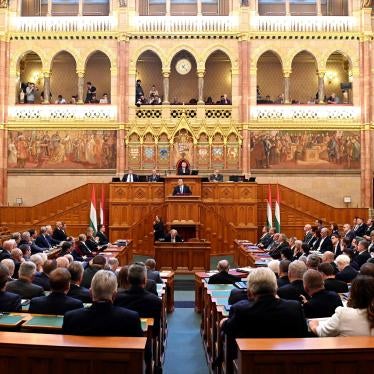- The Hungarian government’s interference with media freedom obstructs journalists from holding the authorities to account and keeps the public from accessing information.
- The government’s increased control over the media market is linked to its broader assault on rule of law in Hungary, including undermining judicial independence.
- The EU needs to recognize the attack on media as part of the government’s erosion of the rule of law, and take action to address it, including under Article 7 of the EU Treaty.
(Berlin, February 13, 2024) – The Hungarian government’s interference with media freedom and pluralism, part of its systematic attack on the rule of law, obstructs the work of independent journalists in holding the authorities to account and prevents the public from accessing information, Human Rights Watch said today.
The 29-page report, “‘I Can’t Do My Job as a Journalist’: The Systematic Undermining of Media Freedom in Hungary”, documents the increased obstacles and constraints independent journalists and media face under the government of Prime Minister Viktor Orban.
“The clear objective of hollowing out media freedom is to prevent the public from knowing what the government is doing or holding it to account,” said Hugh Williamson, Europe and Central Asia director at Human Rights Watch. “The European Union needs to recognize the attack on media as part of the Hungarian government’s erosion of the rule of law, and take action to address it, including by moving the Article 7 process forward urgently.”
Since 2010, the ruling Fidesz-KDNP government has used its power to deliberately dismantle media freedom and pluralism through control over the media regulatory body, which has allowed pro-government outlets to dominate, by exerting direct political control over the public service broadcaster, and financially rewarding pro-government outlets.
Independent and investigative journalists face major obstacles in their work, including surveillance, threats, limited or no access to decision makers and public information and smear campaigns against them in pro-government media. Reporters Without Borders 2023 World Press Freedom report, ranked Hungary 72 out of 180 countries.
Human Rights Watch interviewed representatives of media organizations, journalists and editors, and a media owner who have experienced the harmful effects of the clampdown. The attacks on the free press take place against the backdrop of the government’s persistent undermining of rule of law, its hijacking of public institutions, and its silencing of civil society groups and critical voices.
While the government did not respond to comments on findings, the main regulator, the Media Authority, in a December letter responded that the body is independent with a nomination process set out in domestic law, and that the public service broadcaster should provide public service media and news service programs and protect the independence of such programs.
Human Rights Watch found that the government is using its near media monopoly to strengthen its hold on democratic institutions. This distortion of the media landscape obstructs the work of independent and investigative journalists and prevents the Hungarian public from accessing reliable and factual information to make informed political choices.
After Fidesz won the 2010 elections, the government started to seize control of the media. It used its two-thirds majority in parliament to overhaul the media law, and packed the Media Authority, the media regulator, and its and Media Council with Fidesz loyalists. The government fired over 1,600 journalists and media workers at the public service broadcaster (MTVA), replacing them with government talking heads, effectively turning MTVA into a government-controlled broadcaster. Current and former MTVA employees told Human Rights Watch that reporters are told by their editors what and how to report, and which terms to use and to avoid, and if they do not like it, that they can pack and leave.
The government’s systematic clampdown on independent media intensified with the 2018 creation of the Central European Press And Media Foundation when media owners close to the Orban government transferred approximately 500 media outlets to the foundation. The government bypassed national competition rules when Orban signed an order stating that the donations of the outlets were a matter of “national strategic importance in the public interest.”
Independent journalists say that they have virtually no access to public data from state institutions or government officials and Fidesz politicians. Independent journalists and outlets are restricted, sometimes banned, from attending government news conferences.
Pegasus spyware surveillance has been used against some independent journalists and outlets and others regularly face smear campaigns by pro-government outlets, creating a climate of fear and intimidation. Independent media outlets have closed, or changed ownership and turned pro-government overnight, including the web-based outlets Origo and Index, further limiting the public from accessing independent and factual information.
The government’s increased control over the media market is linked to its broader assault on rule of law in Hungary, including undermining judicial independence and state capture of public institutions, Human Rights Watch said.
The European Parliament raised concerns about the lack of media pluralism in Hungary in 2018 when it triggered Article 7 proceedings against Hungary, the EU treaty-based mechanism to deal with EU states that put democracy and fundamental rights principles at risk. In May 2023, a European Parliament committee strongly condemned the illegitimate use of spyware by EU governments, including Hungary.
The European Commission should urgently consider triggering infringement proceedings on Hungary on the basis of the Media Freedom Act.
The EU Council should move its scrutiny forward under Article 7 over the threat that the Hungarian government’s actions pose to EU values, by adopting specific and time-bound rule-of-law recommendations and holding a vote to determine that there is a clear risk of a serious breach of EU values in Hungary. As Hungary will take over the rotating EU Council presidency in July 2024, it is pivotal for the Council to act immediately to arrest the democratic backsliding, Human Rights Watch said.
“EU institutions should push the Article 7 process forward and use their legal enforcement powers to protect independent media and freedom of information currently under attack as a consequence of Hungary’s dismantling of the rule of law,” Williamson said. “Independent journalism is a cornerstone of democracy and crucial for holding governments to account for power abuses.”









